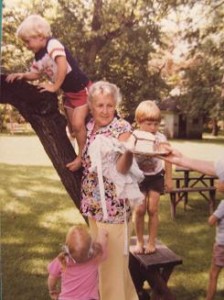 My mother was a yes-mom who loved trying new things and taking risks. She especially loved children and thought every idea that came from the mind of a child was a good one. As a matter of fact, many of her adult ideas were childlike. For example, she used to have us collect rocks in a bucket then climb in the car. She’d drive us around Wilmette with the windows down telling us to throw rocks at stop signs to see if we could hit the middle and make a “ping”. To her it was good clean fun. Today she’d probably be behind bars. But being raised by a mom who never worried about the what-ifs made for a delightful childhood.
My mother was a yes-mom who loved trying new things and taking risks. She especially loved children and thought every idea that came from the mind of a child was a good one. As a matter of fact, many of her adult ideas were childlike. For example, she used to have us collect rocks in a bucket then climb in the car. She’d drive us around Wilmette with the windows down telling us to throw rocks at stop signs to see if we could hit the middle and make a “ping”. To her it was good clean fun. Today she’d probably be behind bars. But being raised by a mom who never worried about the what-ifs made for a delightful childhood.
Actually, mom never worried about a thing. She used to tell us, “I have nothing to worry about; your father does enough for both of us.” That was accurate.
As we move farther into the new year, my mind wants to wander forward through the months, wondering what will happen. All of us look back to last year at this time when 2009 was stretched out in front of us and shake our heads remembering how little we knew. Here we are at another January, and after looking back, today we worry forward.
Worrying comes naturally to most of us. Last January we had no concerns about pancreatic cancer, yet it came. So our brains follow that with, “You’d better worry about that and lots of other things for this year,” as if fretting about the unknown could possibly help.
As Nate’s illness progressed, I worried about quite a few things. What if he fell again? What if he broke a bone and landed in the hospital? What if we couldn’t get him home again? What if I got the meds mixed up? What if he got out the front door and walked away without us knowing? What if he cried out in pain as he died or left us with an expression of agony on his face?
What if, what if, what if. Not one of these things happened. In essence, I worried for nothing. That’s one reason why worry isn’t good. A second and more important reason is that stressing about the future betrays a lack of trust in God to care for it. Scripture tells us worrying never helps a thing. (Luke 12:25) And more serious than that, it chokes out God’s efforts to guide us while we’re trying to be our own guides. (Matthew 13:22)
All of us have enough to do living one day at a time. We don’t need to mentally travel into the future putting down roots of worry there, wasting time and energy on unfruitful thinking while eroding our relationship with the Lord. He’s watching and making a continual assessment of what we need. Better than that, he’s the only one able to satisfy those needs.
I believe God is constantly preparing to take care of our basic needs ahead of our arrival to the future. We saw it happen again and again with Nate’s cancer and related needs, sometimes in dramatic ways. I’m ashamed to say I was often surprised when the needs were met, considering it a rare gift each time rather than the fulfillment of what God said he was going to do all along. Didn’t I believe him? Apparently not.
I hope to do better on that score in 2010, expecting my basic needs to be met through God’s provision, then responding with gratitude. That is precisely what Jesus was describing when he told us to “have the faith of a little child.” Children have faith that their parents will care for them and don’t wrestle with the what ifs. When parents do meet their needs, security and trust are built into their lives and they can transfer that kind of faith-in-parents to faith-in-God without too much trouble. We could take a lesson.
Maybe that’s what mom found so attractive in kids, their complete abandon of worry. As she spent more and more time with them, she became like them in that way. Once again, we could take a lesson.
There’s only one thing to be worried about: buckets of rocks in the back seat of a car.
“For all these things [food, clothing, shelter, goods, possessions] the nations of the world eagerly seek; but your Father knows that you need these things. [You won’t be] forgotten before God. Indeed, the very hairs of your head are all numbered. Do not fear; you are… valuable.” (Luke 12:30, 6b-7)


